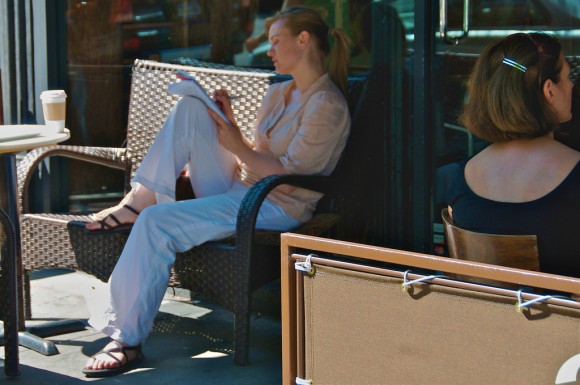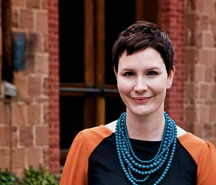What We Do When We Make Space

Credit: Ed Yourdon, see link below.
There are 2.5 quintillion bits of information added to the Internet every day. As a result, each time we access the Web, we are offered something new, a shot of dopamine: a like! a share! an email! a purchase! Our egos are bolstered, our nervous energy absorbed. While ideas can spark online, it’s more often through face-to-face conversations, sketches in our source books, extended hours lost in a project or even in sleep, that ideas grow legs.
Researchers at the Harvard Business School believe that always being plugged into the Internet can erode performance. One researcher observed that “certain cognitive processes happen when you step away from the frenetic responding to emails.” Indeed, the history of science has revealed that insights not only occur in the laboratory but while scientists are engaged in a mundane task or even sleeping.
Disconnecting allows us the mental real estate necessary for invention.
Cultivating space, mentally and physically offline, is fundamental to our life-long development as creators. As a means of necessity, U.S.-based artist Samantha Cotterill restricts her time online. “While going on the Internet can offer a wonderful source of inspiration, its accessibility to all things creative can allow me to easily get lost in it and lose sight of how much physical work time is being neglected. I would mistakenly tell myself ‘just 20 more minutes and then I’ll start work,’ and find myself still saying that three hours later. It takes time for me to get into a good work rhythm, and if I spend much of that time browsing the Internet, then another day will have gone by without any real work being accomplished.”
Listen and create
The truth is, we need space to create.
Geez is one place where I myself have been given space.
From beginning to end, Geez has informed my thinking: introducing me to the work of philosopher Albert Borgmann, immersing me in their “Look Mom: I’ve gone Digital!” issue, rubbing me the wrong way with too many articles to count, and all the way, a bigger, wider Spirit drawing my thoughts and feelings to a place of inner discontent.
“An artist’s waiting,” writes Rollo May in The Courage to Create, “is not to be confused with laziness or passivity. It requires a high degree of attention, as when a diver is poised on the end of the springboard, not jumping but holding his or her muscles in sensitive balance for the right second. It is an active listening, keyed to hear the answer, alert to see whatever can be glimpsed when the vision or the words do come. It is a waiting for the birthing process to begin to move in its own organic time. It is necessary that the artist have this sense of timing, that he or she respect these periods of receptivity as part of the mystery of creativity and creation.”
All creativity begins with longing to see something new in the world.
Children know this, for they are master wanters. They long for a tree fort in the backyard, even though the tree’s circumference is a mere seven inches. They want a party with red streamers and an Easter egg hunt for 150 guests this afternoon. Their longing is strong. They can see what we cannot, their wants are deep and, in this way, they lead us, for creation must begin with desire.
“A common symptom of modern life is that there is no time, for letting the impressions of the soul to sink in,” writes Thomas Moore in Care of the Soul. “Yet it is only when the world enters the heart that it can be made into a soul. The vessel in which soulmaking takes place is an inner container, scooped out by reflection and wonder.”
Soulmaking
We sketch out our longings in journals, think about them in the night hours, jot them on our iPads, post our growing interests on Pinterest pages. Slowly, we give name to our desires. And then, in the cause of soulmaking, we give them legs.
In my own life, carving out space often looks like quieting my inner task master, putting aside the to-do lists and taking a breath. I sit at my desk and draw my eyes towards Natalie Goldberg’s words taped on the wall:
“Stress is basically a disconnection from the earth, a forgetting of breath. Stress is an ignorant state. It believes that everything is an emergency. Nothing is that important. Just lie down.”
And I do. I physically get on the floor and lie down. And if I lie long enough, my heart rate begins to slow, I notice the shadowed leaves pushing and pulling with the wind, and new thoughts come.
Much of my book was written in the quiet of night. At the start, I had 3-month-old baby waking to nurse and I’d sit at 2 a.m., feeding my child in the dark of my bed and the lines would come.
When we create, we give life to our longing, we make what we want to see in the world. We make what should be in the world. And in the process, we make space for others to do the same.
 Christina Crook is a poet, essayist and author of the new book, The Joy of Missing Out: Finding Balance in a Wired World.
Christina Crook is a poet, essayist and author of the new book, The Joy of Missing Out: Finding Balance in a Wired World.
Image (top): Ed Yourdon


Sorry, comments are closed.